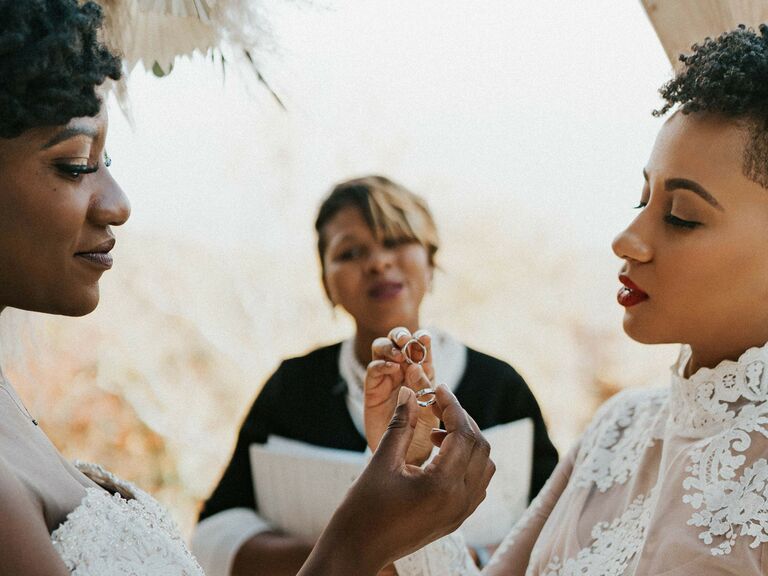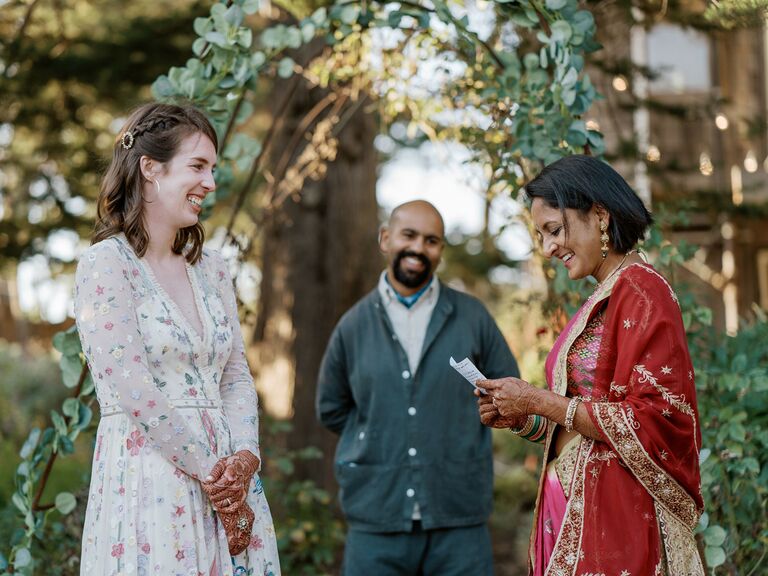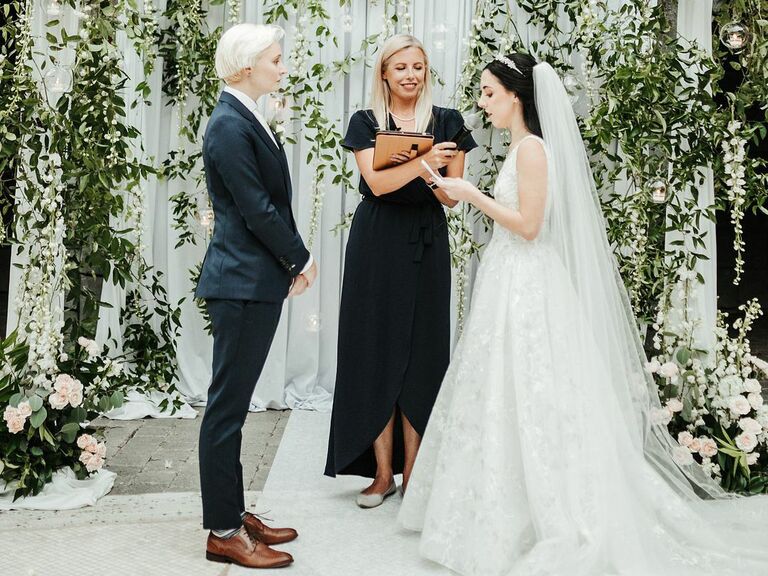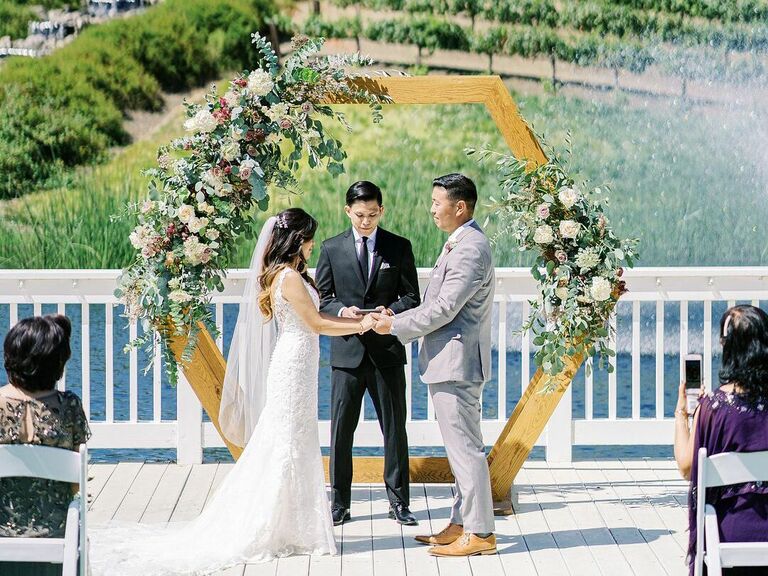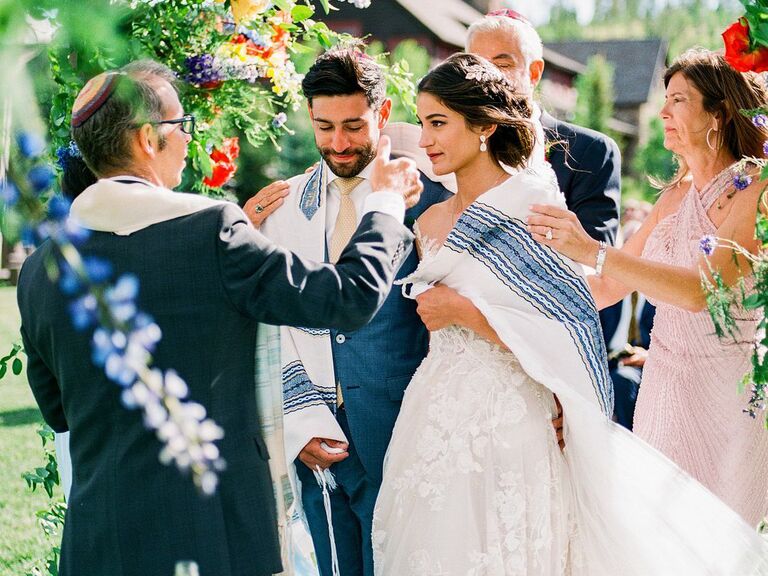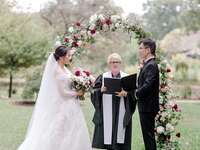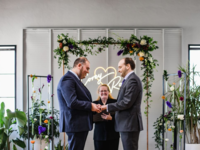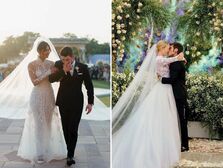Delete 'Wedding Officiant Near Me' From Your Search Bar & Listen to Our Experts
Let's start with the basics. What's a wedding officiant? Well, they're someone who not only must be legally certified or ordained, they should be someone you feel comfortable with that can keep your guests engaged. With those qualifications and more, there's no surprise why simply searching "wedding officiant near me" feels overwhelming since so many options are available. Instead of trying to pick the perfect person alone, we rounded up everything to know about wedding officiants for you. From how to find someone to marry you in your area to what an officiant says during the ceremony, we answer all your frequently asked questions regarding marriage officiants. (Don't forget that once you're done beefing up your officiant knowledge that you can head to The Knot Vendor Marketplace to book a great pro.)
In this article: What Is a Wedding Officiant? | What Officiants Do | How to Find One | How to Choose One | What Officiants Say | How to Ask Someone to Officiate | How to Coordinate After Booking
What Is a Wedding Officiant?
A wedding officiant is a person who marries people and is legally permitted to officiate a marriage ceremony. "Wedding officiants are love warriors who celebrate other love warriors," says wedding expert Karla Villar. Villar is a love storyteller and co-owner of Once Upon a Vow, which she runs with her sister Dani VillaRamos, helping more than 500 couples celebrate their love. "We work in a space that revolves around the source energy of love, so we use it to create ambiance and resonate with others."
The term includes a wide variety of types of wedding officiants, such as religious leaders who officiate weddings. But we'll talk about that more later.
What Does a Wedding Officiant Do?
The person who officiates a wedding leads and oversees the ceremony from beginning to end and is who can legally marry a couple. The wedding officiant conducts the flow of the ceremony and signs your marriage license to ensure your union is legally binding. Beyond being the director of the ceremony, there are other wedding officiant duties. "Officiating weddings is a lot more than writing ceremonies," Villar explains. "It's an energy exchange between us, as officiants, our couples and their invited loved ones." Additionally, wedding officiants can be a source of support for couples who may not have backing from their families.
In short: the wedding officiant role necessitates a candidate that can command a crowd, is responsible, caring and supportive and is well-spoken. If you're wondering if the person you have in mind is up to the task, here are some questions for potential wedding officiants to aid the vetting process.
How to Find a Wedding Officiant
Want to know where and how to find a wedding officiant? Here are a few effective ways to find the right person to hire as an officiant:
- Scroll through The Knot Vendor Marketplace for experienced, professional wedding officiants in your wedding location. You can read couples' reviews of the candidates in your area before you hire one to officiate the wedding.
- Ask recently married friends for referrals. Finding a person who's married people in the past and done a good job is a great option.
- Ask your other wedding vendors. Your photographer or wedding planner may know of reputable individuals whom they've heard of or worked with in the past.
- Contact your house of worship.
- If your ceremony site is not a house of worship, contact city, town or village halls and ask about judges or justices of the peace available for weddings.
- Ask a loved one to get ordained and officiate your wedding.
At The Knot, we highly encourage couples to spend their wedding budget thoughtfully. Book small business owners whose worldviews align with yours. Live out your values as a couple and work with BIPOC-owned, LGBTQIA+-owned, AAPI-owned or women-owned businesses in your area. (The Knot Pro Tip: Use the diversity filters on The Knot Vendor Marketplace to find vendors you truly believe in—and who believe in you too.) "We are a part of a network of wedding pros that are invested in doing things better and disrupting stale and limited concepts about weddings, relationships and celebrations," Villar says. "There are people of all races and ethnicities and backgrounds that seek us out for our stances and values. Since I'm in a largely white cis-het industry as an immigrant and genderqueer person, I'm here to resonate with and hold space for all the stories that are not often told. We want all of our communities to know we're here for them."
How to Choose an Officiant for Your Wedding
To help narrow your search for a wedding officiant near you, give some thought to the different types of wedding officiants out there. Ultimately, the type of ceremony you want will determine who's the best person to officiate. Once you've decided on the type of celebrant you want, get clear on your values as a couple before jumping into a wedding officiant contract. Knowing your priorities ahead of time will make finding a wedding officiant near you a lot easier. Below are some of the wedding officiants you can pick for your celebration.
1. Look for a Religious Authority Figure
If you and your partner know you want to have a religious celebration, you need to look at officiants for weddings that specialize in your religion. For example, a traditional religious ceremony requires a minister whose denomination has authorized them to carry out ceremonies.


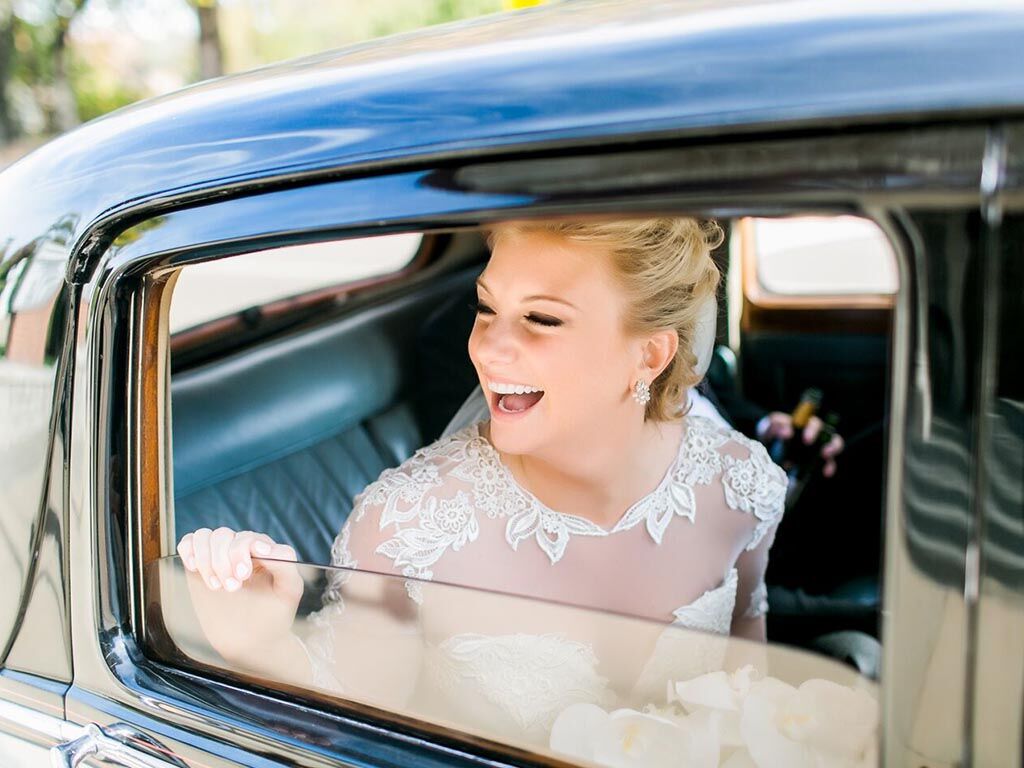
2. Check Out Nontraditional Officiants
On the flipside, if you're planning a modern, nontraditional ceremony where you break mid-vows to perform a Beyoncé solo, there's an option for you too. Other options include nondenominational officiants, judges and civil officiants. And for anyone practicing a separate religion from their future spouse, check out interfaith wedding officiants.
3. Find a Bilingual Wedding Officiant
Is it important to you that your officiant shares the same cultural background and language as some of your guests? Then you should look into bilingual wedding officiants so they can make guests on both sides of the aisle feel at home.
4. Ask a Loved One to Help Out
You can also ask a friend or family member to officiate for you (it's relatively easy to arrange—many celebrities have officiated weddings for their friends). When deciding on who'll be your officiant, consider someone you're close to to ensure the wedding feels personalized and intimate. Also, when you ask someone in your circle to officiate a wedding, you may inspire them to continue to do so, which could push the industry forward. "I encourage all of my non-binary and trans siblings out there who are romantics, who enjoy participating, planning celebrations, or have talents that fit into the wedding space to consider where and how you might find your niche," Villar says.
What Does the Officiant Say at Your Wedding?
What the officiant says at the wedding is entirely up to you. Typically, the officiant is the first to walk in during the wedding processional because they'll guide the ceremony order. After the processional, the wedding officiant will usually welcome guests to the ceremony with a few words, they may also offer a message or homily. The officiant will also walk you and your partner through your vows and declaration of intent, likely in a call-and-response format. The officiant will also declare you legally wed and may offer some closing words and instructions to wrap up the ceremony.
Depending on whether you're incorporating any unity rituals into your ceremony, the officiant may also have some words to say to help facilitate that tradition. What the officiant says may also vary if you choose to recite personalized vows, instead of traditional wedding vows. Also, if you're hosting a religious wedding ceremony then there may be certain religious readings or prayers that the officiant recites.
Ultimately, it's important that you connect with your wedding officiant before the big day to craft the wedding ceremony and align on what the officiant will say at your wedding. Most pros will ask you to fill out a questionnaire so they have a general idea about your relationship before you get to work on the ceremony script, so be prepared for the questions potential officiants may ask you ahead of time.
For experts Villar and VillaRamos, getting to know the couples is their favorite part of the job. "Who they are individually and together, how they interact with each other, the details of their lives that seem inconsequential but are, in fact, incredibly meaningful," they say. "Many times, we can relate to our couples and the challenges they've faced, the dreams they share, the future they're working towards, the values they've built their lives around. It's a profound experience and one we're super grateful for," they add.
How to Ask Someone to Officiate Your Wedding
You've found an officiant and now it's time to get them on board. Asking someone to officiate your wedding is a big deal. After all, they're going to be leading your union. As such, you'll want to ask them in a sweet and thoughtful way. You can send them a note or a gift—or take them out for a meal. Unable to meet in person? Schedule a video or phone call instead. If you're booking a pro, ensure you meet with them at least once or twice so they become familiar with who you are and your love story.
How to Coordinate With Your Officiant After Booking
Once you've searched "marriage officiants near me" (the way we've guided you), vetted pros and booked your dream person, get the ball rolling. Start with asking your officiant how they prefer to communicate so you can talk to each other easily and efficiently. Then, ask them what they need from you, which could be them giving you a couples questionnaire, like we mentioned earlier, or you scheduling marriage counseling sessions with them before the wedding. You'll also need to talk to the officiant about your ceremony timeline, probably multiple times, so you're both on the same page about how the day will look. During this conversation, trust your vendor's insight because their expertise will help you pull off a successful ceremony.
Additional reporting by Chapelle Johnson
